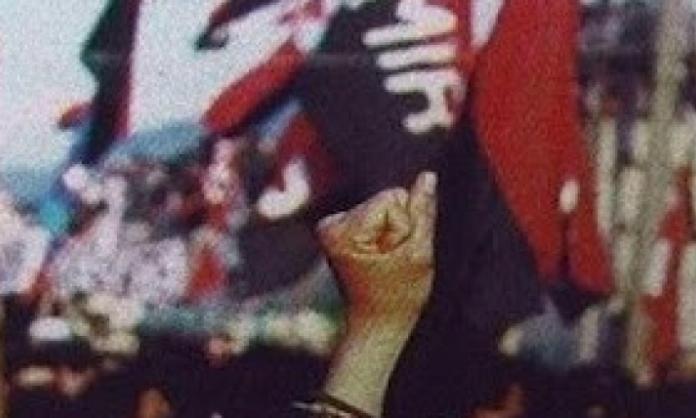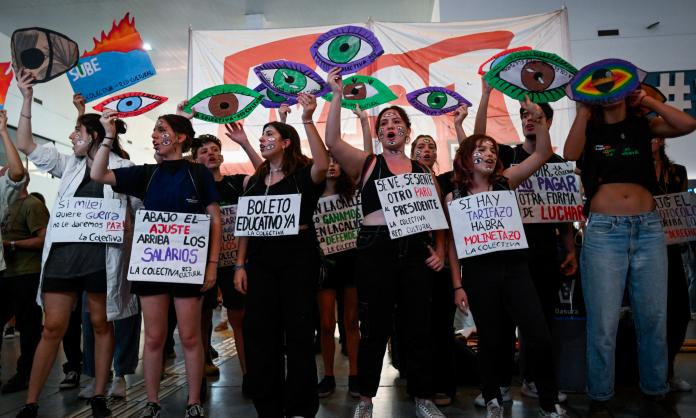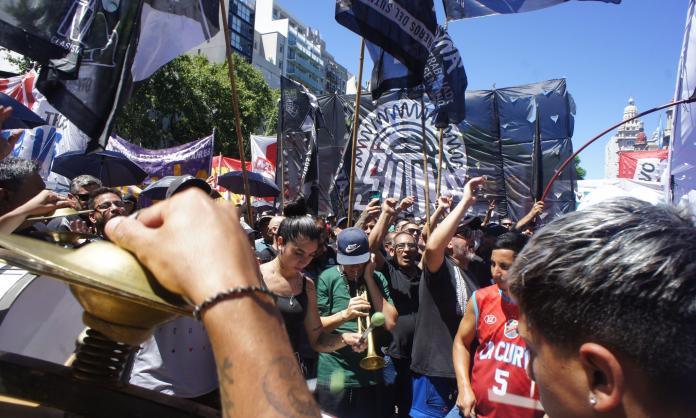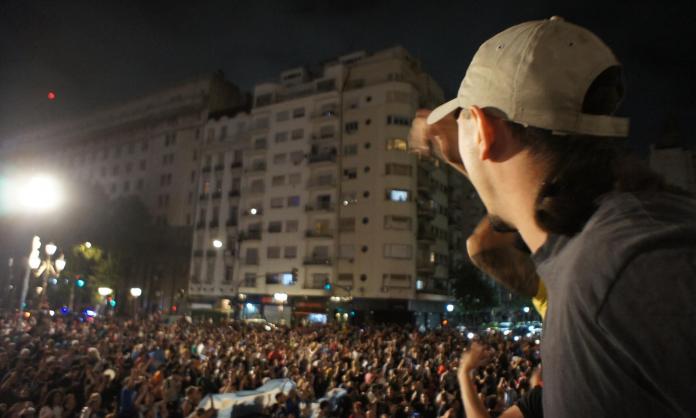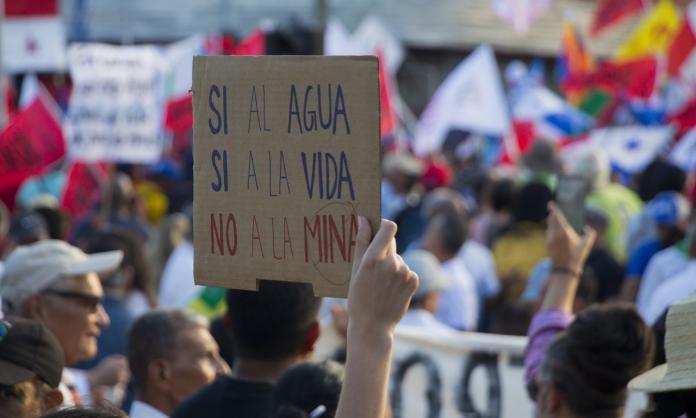This year marks 50 years since the military coup and bloody crushing of the Chilean workers’ movement in September 1973, and the beginning of the Pinochet dictatorship, which lasted until 1990. The dress rehearsal for the 11 September coup happened on 29 June and is often referred to as the Tanquetazo (for the military’s use of tanks).
Lieutenant Colonel Roberto Souper, who a week earlier had been discovered to be part of a coup conspiracy, led a column of sixteen armoured vehicles, including six tanks from the 2nd Armoured Regiment, into downtown Santiago. They encircled La Moneda Presidential Palace and the Ministry of Defence. Just before 9am, the tanks opened fire.
At 9:30am, President Salvador Allende gave a national radio address announcing his decision to defend the government and calling on the workers of Santiago to occupy the factories “and be ready in case it is necessary to fight alongside the [constitutionalist] soldiers of Chile”.
The Tanquetazo signalled the final, decisive turning point in the struggle for power that had emerged since the election of the Allende Unidad Popular government.
Below are abridged translations of declarations from the Movement of the Revolutionary Left between May and July 1973. The MIR was founded during a radicalisation in the mid-1960s and consisted of a range of political tendencies— Miguel Enriquez, the group’s leader, called it a “a bag of revolutionary cats”.
The MIR’s assessment and perspectives best capture the emerging situation in Chile and the challenge before the workers’ movement and the left.
TO FACE THE CIVIL WAR
Miguel Enriquez, general secretary of the MIR, May
The fundamental task is to accumulate the necessary mass forces to prevent the civil war. This accumulation of forces can be ensured only through the development of a Revolutionary Program of the People, arising from the discussions of the working class and the masses [pueblo] themselves, in industry, agriculture, housing, education; revitalising, arming and uniting the masses; developing and strengthening mass organisations that, incorporating all sectors of the people, organically allow the working class to exercise its vanguard role over the various layers among the masses, with the perspective of the development of an alternative popular power to the bourgeois order and independent of the government: the Workers Communal Commands.
THE TASKS OF THE PEOPLE AGAINST THE COUP OFFENSIVE
Public Declaration of MIR, 29 June
[In the face of the Tanquetazo] the masses responded with immediate mobilisation, occupying factories, landed estates, workplaces; driving forward Popular Power through the creation of Workers Communal Commands.
The working class and the masses must now unleash a thorough offensive against the Chilean reactionaries and ultra-reactionaries. The masses have more than enough strength to resolve the crisis in their favour. Only the mobilisation and independent organisation of the workers and determined and immediate combat against the bosses’ and imperialist reaction can definitively defeat this coup attempt and any subsequent attempt.
The working class and the masses are clear that the current crisis cannot be resolved by forces other than the forces of the working class itself. It is the working class organised in the Communal Commands and the Self-Defence Committees of the Communal Commands that must take control of the local government areas, the neighbourhoods, the cities and the countryside.
That is why we call on the working class and the masses to stay alert and mobilised. To maintain the occupation of the factories, farms and workplaces; reinforcing the Self-Defence Committees and developing the massification and organisation of the Surveillance Brigades. To not give back any of the big companies taken over by the workers and to impose workers’ control on the rest.
The MIR calls for the immediate handover of all factories with more than 14 million escudos [former currency] of capital to the power of the workers, to put into the hands of the workers all large landed estates, to expropriate all the large distributors and warehouses, and that the masses immediately take into their hands the distribution and supply of goods to the population. Close, expropriate and pass into the hands and control of the masses all the radio stations, newspapers and television channels that today are at the service of the coup.
The MIR calls for a vast revolutionary and popular offensive against the enemies of the people, against the bosses’ reaction and the coup. The MIR calls to fight for the People’s Revolutionary Program, a platform aimed at solving the most urgent problems of the masses. To create and strengthen Popular Power, creating Workers Communal Commands in all the local government areas, assuming control and surveillance of the local areas and leadership of the struggles of the working class and the people. To push forward harder than ever with the struggle to replace the bourgeois parliament with the Assembly of the People and to impose the establishment of a true workers’ government.
RADIO SPEECH
Miguel Enríquez, 6 July
The levels of activity, organisation, awareness and willingness to fight that the working class has achieved are immense: the working class is today a constituted army, determined to fight for their interests and to resist the reactionary onslaught. The working class and the masses from within the factories and landed estates, from the communal commands and from the peasant councils, have given notice to their political leaders that the fight has left the corridors of parliament and that they will not allow setbacks or concessions. It is here and now when the vanguards, the leaders and the parties will be subjected to a trial by fire.
The working class and the masses are not so naive as to fall for the propaganda and wavering; they know they are strong and determined to continue their counter offensive. The workers will not back down, they will not disorganise, they will not abandon the positions they have taken.
It is not necessary to take a step back to take steps forward. The working class and the masses do not need a truce or a respite. It’s the bosses’ class that needs a truce to develop their tactics. Nothing today would be more dangerous and more suicidal than abandoning the positions taken up and to open a truce. That would mean, like it or not, to demoralise, disorganise and divide the working class and fall prey to the bloodthirsty force of the capitalist class.
For all these reasons, the task of revolutionaries and workers is to develop and extend the popular and revolutionary counteroffensive now under way, in a way that allows the working class and the masses to express their strength and fundamentally multiply it.
Let’s take on the call of the Communal Commands of Santiago and promote a national strike that allows us to give a definitive turn to the political situation, that gives the coup leaders notice of the workers’ willingness to fight, that tells the blackmailers that the working class will not capitulate, that they will not return the companies taken over and that they will continue to take up positions in factories and farms.
Let’s promote a national strike during which we strengthen and multiply the communal commands. Let’s promote a national strike that demands of the government that they carry out, through the direct struggle of the masses, the task of ending private ownership of all the factories with more than 14 million escudos, of all the farms between 40 and 80 hectares, and expropriate the distribution firms and once and for all establish egalitarian and equitable distribution.
The days that are coming will be decisive. The working class and the masses must maintain the positions conquered, and reach for others. The workers must demand a revolutionary and determined leadership, they must reject the backsliding of the vacillators.




